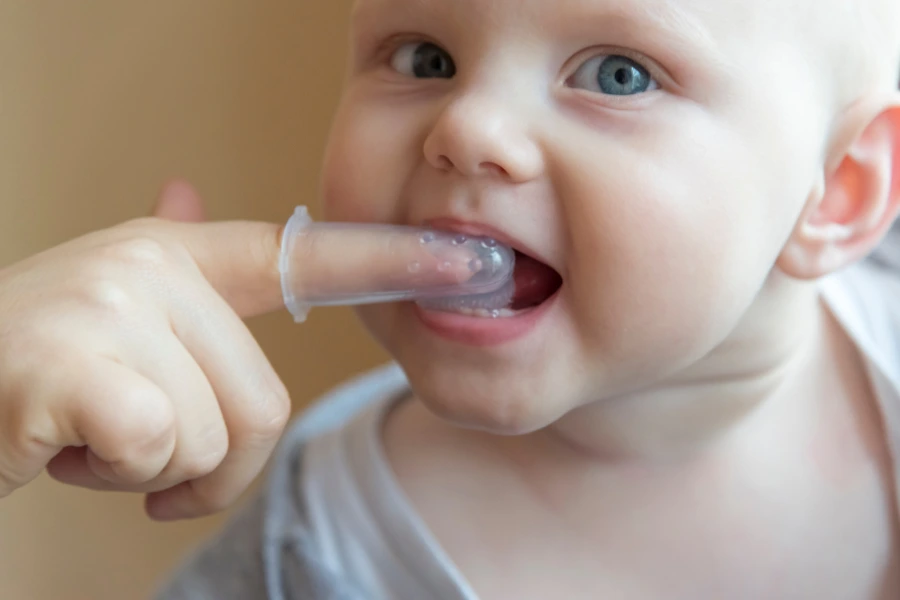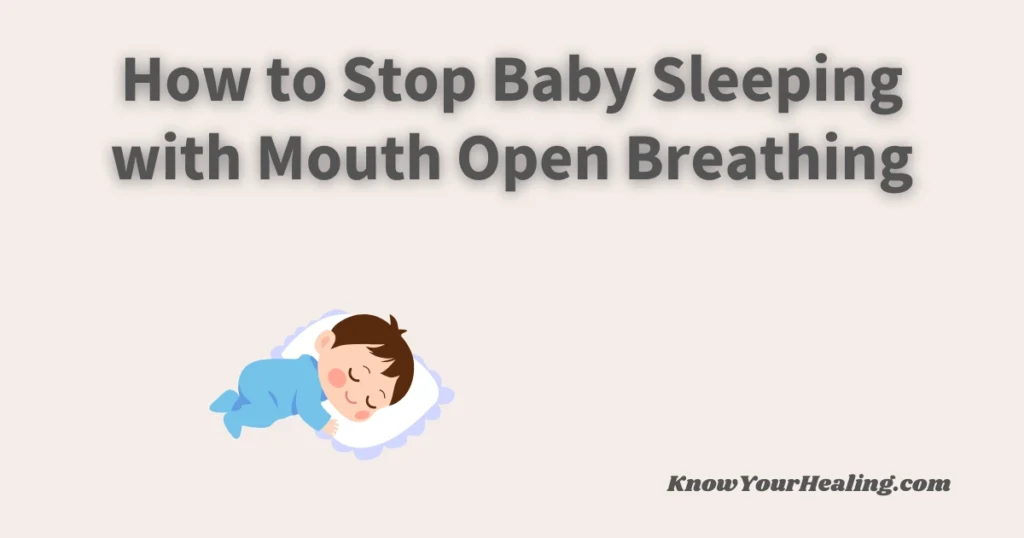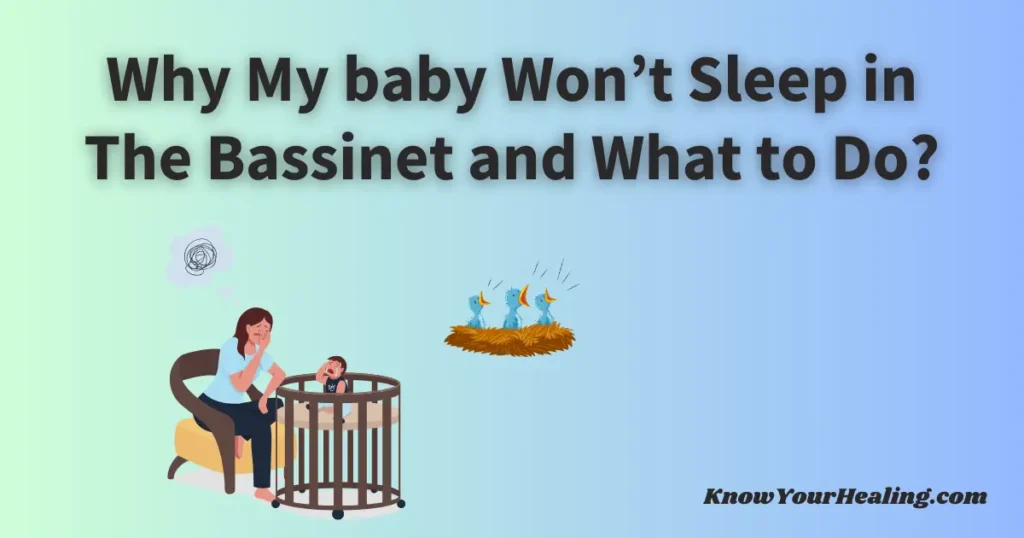How to stop baby sleeping with mouth open breathing is a common concern for many parents worried about their child’s breathing patterns.
Ensuring that a baby’s nasal passages are clear can often help reduce mouth breathing.
This post will explore practical steps to help maintain clear airways for your baby.
Mouth breathing in babies can sometimes indicate underlying issues like nasal congestion or other blockages.
If parents notice their baby consistently sleeping with their mouth open, it might be beneficial to investigate possible causes like allergies or enlarged tonsils. Understanding these factors can aid parents in taking steps to correct mouth breathing effectively.
Parents seeking solutions may find that small changes in the baby’s sleep environment can make a significant difference.
For instance, a cool mist humidifier can add moisture to the air, potentially easing nasal congestion.
A bulb syringe or NoseFrida can help clear nasal passages before bedtime, promoting more comfortable and healthy sleep.
Understanding Mouth Breathing in Babies

Various factors can commonly influence mouth breathing in babies. If persistent, it might lead to health complications and can affect their facial development.
Causes of Mouth Breathing in Babies
Nasal congestion often leads to mouth breathing in infants. A stuffy nose can block the nasal passages, forcing the baby to breathe through their mouth for relief.
This can be due to colds, allergies, or dry air.
In some cases, airway obstruction, enlarged tonsils, or adenoids may be the primary reason. Developmental issues such as a deviated septum or tongue tie can also impact normal breathing in young babies.
New parents should be observant and seek medical advice if the issue persists.
Health Complications Associated with Mouth Breathing
If a baby frequently keeps their mouth open while sleeping, it may lead to specific health problems.
Chronic mouth breathing can contribute to dry mouth, making them more susceptible to dental issues.
It might also affect the child’s health by causing restless sleep or leading to sleep disorders like sleep apnea.
Lack of nasal breathing might reduce nitric oxide production, essential for optimum oxygen transfer and maintaining a healthy respiratory system. In such cases, it is a good idea to consult a healthcare provider to explore treatment options.
Mouth Breathing and Facial Development
Frequent mouth breathing can influence a baby’s facial structure. It may result in an open bite or cause the face to develop into a long face syndrome over time.
This can affect oral health and lead to orthodontic treatment later in life.
Ensuring the baby’s airway remains clear is crucial. A nasal aspirator or saline drops can help maintain clear nasal passages, encouraging the baby to become an obligate nasal breather naturally.
How to Stop Baby Sleeping with Mouth Open: Signs and Symptoms to Watch For
Monitoring a baby’s breathing patterns is important for identifying potential health issues.
Parents should be attentive to open-mouth breathing during sleep, as it may indicate underlying conditions.
Recognizing Mouth Breathing During Sleep
Open mouth breathing during sleep in babies can be a sign of nasal blockage. This condition often results in nasal passages being obstructed due to congestion.
New parents might observe their sleeping baby exhibiting this behavior, especially when they have a stuffy nose.
This can disrupt normal breathing and lead to a dry mouth.
Frequent open-mouth breathing warrants attention as it can indicate a persistent problem. Regularly checking for these signs helps understand the frequency and severity of the issue.
Identifying Related Respiratory Issues
Mouth breathing is sometimes linked to respiratory issues such as sleep apnea or airway obstruction.
Babies with these conditions might struggle for enough oxygen during sleep. Other signs can include snoring, restless sleep, and excessive daytime sleepiness.
Chronic mouth breathing might affect the baby’s airway and lead to health problems such as recurrent respiratory infections. When these symptoms persist, it is a good idea to check with healthcare providers, as underlying issues may require treatment.
Connecting Behavioral and Sleep Disorders
It can be indicative of behavioral issues like attention deficit hyperactivity disorder (ADHD).
Sleep disorders from breathing difficulties may also develop, impacting a child’s health. Conditions such as a deviated septum or large adenoids might influence these patterns.
Identifying these signs early can help manage the risks of prolonged health conditions. Medical advice and possible interventions from ENT specialists can be valuable in ensuring proper breathing and sleep quality in young children.
Diagnosis and Professional Advice

Identifying why a baby sleeps with their mouth open involves consulting healthcare professionals.
Proper diagnosis helps determine if underlying issues like nasal congestion or structural problems contribute to open-mouth breathing.
Treatment options vary, including non-invasive solutions or surgical intervention for persistent cases.
Consulting with a Pediatrician
Pediatricians are often the first point of contact for concerned new parents.
Newborn baby sleep often involves nasal congestion, but persistent mouth breathing might signal deeper health conditions.
During visits, doctors will evaluate the baby’s airway and nasal passages.
They might recommend using a bulb syringe or saline drops to clear a stuffy nose.
Pediatricians can also assess for signs of upper airway obstruction or other respiratory issues and provide guidance on proper breathing techniques.
Exploring Diagnosis for Sleep-Related Conditions
Chronic mouth breathing might be linked to sleep disorders like sleep apnea, which affects sleep quality.
ENT specialists might conduct detailed evaluations, including sleep studies, to check for nasal septum deviations or other issues.
This process ensures that the baby gets enough oxygen during sleep.
Nasal congestion may be a common reason for mouth breathing, and addressing it with air purifiers or a cool mist humidifier can often help improve airflow and ensure restful sleep for the baby.
Considering Surgery for Structural Causes
If structural causes like a deviated septum or other airway obstructions are suspected, surgery might be considered.
ENT specialists can assess whether surgery is viable for improving nasal breathing.
Such intervention aims to rectify physical barriers in the baby’s nose or other parts of the airways.
Although surgery is typically a last resort after exploring other treatment options, it can be essential for severe cases where non-surgical methods do not adequately resolve open-mouth breathing issues.
Home Remedies and Improvements
Parents often wonder how to stop babies from sleeping with their mouths open.
Simple changes like adjusting sleep positions, adding moisture to the air, and using saline drops can enhance nose breathing. These strategies potentially reduce problems such as dry mouth and stuffy noses.
Adjusting Sleep Positions for Better Breathing
Changing a baby’s sleep position can help improve nasal breathing.
Elevating the head can encourage better airflow through the nasal passages.
Swaddling can be helpful, but ensuring the baby is lying on a flat surface is crucial.
Placing the sleeping baby on their back could help keep the airway open and aligned.
This position minimizes the risk of airway obstruction and promotes healthy breathing patterns.
Proper positioning also helps prevent conditions such as sleep apnea in young children. If concerns about sleep quality persist, consulting a healthcare provider may be necessary for further assessment.
Using Humidifiers for Air Moisture
Adding a humidifier to the baby’s room can significantly aid breathing by moisturizing dry air.
A cool mist humidifier increases moisture levels, preventing the nasal passages from drying.
This added humidity helps in reducing symptoms of chronic mouth breathing.
Moist air helps maintain nasal health and ease the restlessness caused by a stuffy nose.
Consistent humidity levels can also prevent throat irritation and support proper sleep quality.
This simple solution may benefit young babies with ongoing nasal congestion or frequent mouth breathing.
Additionally, it is essential to ensure the machine is clean and maintained regularly to prevent the growth of mold or bacteria.
Applying Saline Drops and Bulb Syringe
Saline drops are an effective treatment option for clearing nasal congestion in infants.
Administering a few saline drops in the baby’s nose can loosen mucus, making breathing through the nose easier.
Afterward, a bulb syringe can gently suction excess mucus from the baby’s airway, relieving blocked noses.
Saline solutions are safe for regular use and can be applied before feeding a newborn or at bedtime.
This method can help prevent conditions like nasal congestion and open mouth breathing.
If the baby continues to have significant breathing problems, consulting with a healthcare provider or using nasal aspirators may be advised.
Behavioral and Environmental Interventions

How to stop baby sleeping with mouth open is important because when babies sleep with their mouths open, it might signal underlying issues affecting their sleep quality.
Addressing these problems can involve promoting nasal breathing techniques, minimizing allergens, and carefully managing pacifier use.
Promoting Nasal Breathing
Encouraging nose breathing is vital for proper breathing and overall health.
Babies are obligate nasal breathers, which means they typically breathe through their noses by default.
Parents can help by ensuring the baby’s nose is clear from blockages.
Using saline drops or a nasal aspirator can remove mucus from the baby’s nasal passages.
Using a cool-mist humidifier to keep the baby’s room at a comfortable humidity level reduces the chances of nasal congestion that leads to open mouth breathing.
Reducing Exposure to Allergens
New parents should limit allergens in the baby’s environment to prevent upper airway obstructions.
This involves regular cleaning of the baby’s room and using air purifiers to minimize dust and pollen.
Wash bedding frequently and ensure no pets are in the baby’s sleeping area.
Reducing dust mites and other allergens can significantly decrease the likelihood of a stuffy nose, a common reason for mouth breathing.
Monitoring allergens closely helps avoid health problems related to chronic mouth breathing.
Managing Pacifier Use
Pacifier use in young children should be managed to promote proper breathing habits.
Frequent or prolonged use may encourage babies to rely on mouth breathing instead of nose breathing.
To reduce open-mouth tendencies, it is a good idea to use pacifiers primarily during sleep and limit their daytime use.
Using pacifiers with ventilation holes can also prevent jaw misalignment, which can contribute to open bite or facial structure issues.
Balancing pacifier use helps foster standard breathing patterns and avoid behavioral or dental health issues in growing children.
Medical Treatments and Therapies
Medical treatments and therapies can help young children who frequently sleep with their mouths open due to underlying issues.
These options aim to improve nasal breathing and tackle health conditions like nasal congestion or sleep apnea.
Exploring CPAP and BPAP Therapies
Continuous Positive Airway Pressure (CPAP) and Bilevel Positive Airway Pressure (BPAP) therapies manage sleep apnea in children. These treatments deliver steady air pressure through a mask, an excellent solution for keeping the upper airway open during sleep.
Parents report improvements in sleep quality for children using CPAP or BPAP, as these therapies help reduce symptoms associated with obstructive sleep apnea.
A healthcare provider must assess whether CPAP or BPAP is suitable based on the child’s health conditions and needs.
Addressing Allergies and Asthma
Allergies and asthma are common reasons why young babies might struggle with nasal breathing. Proper medical treatments can help alleviate stuffy noses and improve airway function.
Antihistamines or nasal sprays prescribed by a doctor can also reduce nasal congestion.
Incorporating air purifiers into a baby’s room and ensuring a cool mist humidifier runs at night can help ease open-mouth breathing due to dry air.
For parents observing frequent mouth breathing, it’s advisable to consult with a pediatrician or allergy specialist.
Surgical Options and Recovery
Surgical options may be considered if anatomical issues like a deviated septum or enlarged adenoids cause chronic mouth breathing.
An ENT specialist might recommend surgery to remove obstructions in the nasal passages, which can help maintain proper breathing and reduce health problems associated with a baby’s nose blockage.
Recovery from surgery typically requires careful monitoring to ensure proper healing. Post-operation, parents and caregivers should follow the doctor’s advice to support the child’s recovery.
They should aim to restore normal breathing patterns and prevent persistent open-mouth breathing. Surgery is a decision made after a detailed evaluation by healthcare professionals.
Dental and Oral Health Considerations

How to stop baby sleeping with mouth open is crucial because mouth breathing in babies can have significant effects on dental and oral health. It can impact dental development and lead to potential issues if not appropriately addressed.
By understanding these effects, caregivers can take steps to prevent potential dental problems.
Impact on Dental Development and Oral Health
Open-mouth breathing can significantly affect a child’s dental development. This habit can result in an open bite, where the teeth do not align properly.
It can also lead to changes in facial structure, as the tongue may not rest correctly against the roof of the mouth. Such habits can cause misalignment or crowding of teeth over time.
Mouth breathing can also contribute to dry mouth by reducing saliva production. Saliva is crucial for oral health because it helps wash away food particles and neutralizes bacteria-produced acids.
A dry mouth increases the risk of tooth decay and bad breath. Studies have shown that chronic mouth breathing can alter nasal passages and the alignment of the upper and lower teeth.
Preventing Dental Issues Related to Mouth Breathing
Addressing the primary reasons for mouth breathing in young children is important to prevent dental issues. When nasal congestion from a stuffy nose causes mouth breathing, saline drops or a nasal aspirator can clear the nasal passages, promoting normal breathing through the nose.
Consultation with a healthcare provider is recommended for underlying issues like tongue tie or nasal septum problems. They can offer treatment options such as myofunctional therapy or refer an orthodontic specialist for further evaluation.
Encouraging proper breathing habits and ensuring a comfortable sleeping position can help reduce dry air in the baby’s room. Maintaining a humid environment can also help.
Final Thoughts
How to stop baby sleeping with mouth open is important for their health. Mouth breathing can cause issues like dry mouth and sleep disturbances. Addressing these concerns helps ensure better sleep quality and overall well-being.
It’s crucial to understand the common causes. Babies might sleep with their mouths open due to nasal congestion or anatomical issues. If the problem persists or seems severe, consulting a pediatrician can provide a more precise diagnosis.
Creating a conducive sleep environment can aid nasal breathing. Ensure the baby’s room has proper humidity and is free of allergens.
A humidifier can reduce dryness, which may help the baby breathe easily through their nose at night.
Simple exercises might also improve nasal breathing. Encourage your baby to play games that focus on nose breathing. Make it fun, like using a feather, to promote consistent practice.
How to stop baby sleeping with mouth open can, in some cases, significantly improve your baby’s sleep patterns and comfort. By addressing mouth breathing, parents can help protect their baby’s health and support their growth and development.




